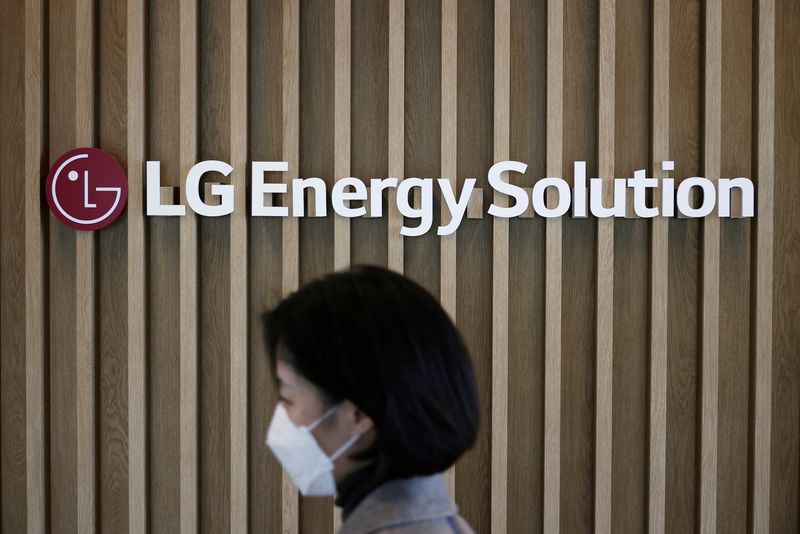By Heekyong Yang and Byungwook Kim
SEOUL (Reuters) -LG Energy Solution Ltd (LGES) booked a 24% quarterly profit drop on Wednesday, far milder than market estimates, as strong sales of batteries to Tesla (NASDAQ:TSLA) Inc offset troubles at automotive clients where chip shortages have hit production.
Rising raw materials prices and supply-chain disruption set LGES up for a lean first quarter, but with Tesla reporting firm sales of its electric vehicles, LGES not only cushioned the blow, but said it has set itself up for a robust second quarter.
Chief Financial Officer Lee Chang Sil, at an earnings briefing, said he expects "double-digit revenue growth" in April-June and that LGES is working to minimise the impact of surging raw material prices through long-term supply deals, investing in mines, and sharing cost burden with automakers.
Its battery order backlog stands at about 300 trillion won, up about 15% from its previous estimate announced earlier this year, the South Korean battery maker said.
"LGES is likely to continue seeing steady battery sales in the second quarter as automakers are stocking up for fear raw material price hikes could further raise battery prices," said analyst Hwang Kyu-won at Yuanta Securities.
For January-March, LGES booked operating profit of 259 billion won ($205.01 million) versus the 141 billion won average of 16 analyst estimates compiled by Refinitiv SmartEstimate. Revenue rose 2.1% to 4.3 trillion won.
It said revenue growth was constrained by "rising costs of raw materials, ongoing global semiconductor shortage and supply chain disruption caused by the military conflict between Russia and Ukraine and periodic COVID lockdowns."
LGES attributed steady operating profit to solid sales of cylindrical battery cells which it makes mainly for Tesla. The firm also produces pouch-type batteries for customers including General Motors Co (NYSE:GM) and Volkswagen AG (OTC:VWAGY).
CAPEX LIFT
LGES also said it has raised this year's capital expenditure budget about 10% from the figure announced in February to 7 trillion won.
Last month it announced plans to invest 1.7 trillion won to build a factory in the U.S. state of Arizona by 2024 to meet demand from startups and other North American customers.
It said it aims to boost annual production capacity to about 520 gigawatt hours (GWh) worth of batteries by 2025, enough to power about 7.3 million electric vehicles. It expects capacity to reach 200 GWh by year-end with cylindrical batteries making up about 30%.
Shares of LGES were down 0.9% at around midday versus the benchmark KOSPI's 1.1% fall.
The stock is down about 16% since its January debut, after LGES was carved out of LG Chem Ltd, as supply-chain disruption has persisted due to war in Ukraine and COVID-19 containment measures in China where Tesla has a factory.
Last week, Tesla's first-quarter earnings exceeded market estimates after the U.S. EV maker delivered a record number of cars at higher prices, saying it had a reasonable shot at achieving 60% vehicle delivery growth this year.
Still, analysts said second-quarter earnings at LGES could suffer from closure at Tesla's factory in COVID-19-hit Shanghai.

Tesla said it has lost about a month of build volume at the plant and that production has resumed at limited levels, which will impact build and delivery volume in the second quarter.
($1 = 1,263.3300 won)